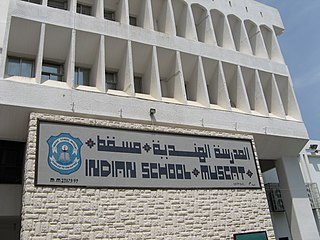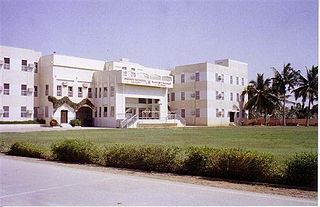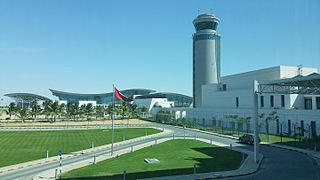
Oman, officially the Sultanate of Oman, is a country located in far southwestern Asia. It is situated on the southeastern coast of the Arabian Peninsula, and spans the mouth of the Persian Gulf. Oman shares land borders with Saudi Arabia, the United Arab Emirates, and Yemen, while sharing maritime borders with Iran and Pakistan. The coast is formed by the Arabian Sea on the southeast, and the Gulf of Oman on the northeast. The Madha and Musandam exclaves are surrounded by the United Arab Emirates on their land borders, with the Strait of Hormuz and the Gulf of Oman forming Musandam's coastal boundaries. Muscat is the nation's capital and largest city.

Said bin Taimur was the 13th Sultan of Muscat and Oman from 10 February 1932 until he was deposed on 23 July 1970 by his son Qaboos bin Said.

The Dhofar Governorate is the largest of the 11 Governorates in the Sultanate of Oman in terms of area. It lies in Southern Oman, on the eastern border with Yemen's Al Mahrah Governorate. It is a rather mountainous area that covers 99,300 km2 (38,300 sq mi) and has a population of 416,458 as of the 2020 census. The largest city, as well as capital of the Governorate, is Salalah. Historically, the region was a source of frankincense. The local variety of Arabic is Dhofari Arabic, which is quite distinct from that of the rest of Oman and from Yemen.
Education in Vietnam is a state-run system of public and private education run by the Ministry of Education and Training. It is divided into five levels: preschool, primary school, secondary school, high school, and higher education. Formal education consists of twelve years of basic education. Basic education consists of five years of primary education, four years of secondary education, and three years of high school education. The majority of basic education students are enrolled on a daily basis. The main education goal in Vietnam is "improving people's general knowledge, training quality human resources, and nurturing and fostering talent."

Salalah is the capital and largest city of the southern Omani governorate of Dhofar. Its population in 2009 was about 197,169.

Indian School Muscat is an Indian school in the Darsait area of Muscat, Oman.
The Education in Oman is provided free of charge up to end of secondary education, though attendance is not mandatory at any level. In 1970 there were only three formal schools with 900 students in the whole state. Oman's national educational program expanded rapidly during the 1970s and the 1980s. In 2006–2007 about 560,000 students attended 1053 public schools. The number of students in private schools is about 65,000. There are also extensive programmes to combat adult illiteracy. Sultan Qaboos University, the only national university near Muscat, was founded in 1986, and in 2006 it had 13,500 students. The Human Development Report found the literacy rate to be 93.0% in adults, up from 54.7% in 1990. For the same period, the youth literacy rate increased from 85.6 to 97.3%. Public expenditure on education was reported to be 4.6% of GDP and 26.1% of total government spending.

Christianity is the religion of 6.5% of the population of Oman, which equals to about 300,000 people. Ninety Christian congregations exist in the country. There is little official record of Christianity in Oman until the arrival of the Portuguese in 1504, but ruins from what is thought to have been a church were located in Suhar. Additionally, Chronicle of Arbela tells of a diocese at Bet Mazunaye, an area which included Oman. However, the authenticity of the sixth-century text is disputed amongst scholars.

Education in Chad is challenging due to the nation's dispersed population and a certain degree of reluctance on the part of parents to send their children to school. Although attendance is compulsory, only 68% of boys continue their education past primary school, and over half of the population is illiterate. Higher education is provided at the University of N'Djamena.
The State of Kuwait, located at the head of the Persian Gulf, supports an educational policy that seeks to provide an opportunity to all children, irrespective of their social class, including children with special needs. Kuwait was ranked 63rd on the Human Development Index report for 2011 by the United Nations Development Programme, placing Kuwait above the regional average.

The Indian School Salalah is an Indian-run, self-financing, co-educational institution, primarily established to meet the academic needs of children of Indian expatriates working in the Sultanate of Oman in the Persian Gulf. The school also admits children of other nationalities. The school is located in the Dahariz area, of Salalah town, in the southern governorate of Dhofar.
Salalah Sports Complex also known as The Youth Complex, is a government owned multi-purpose stadium in the Auwqad district of Salalah, Oman. It is currently used mostly for football matches, and also has facilities for athletics. It the home stadium of the Dhofar Football Club, as well as counterparts Al-Nasr Salalah. Home matches are also played there for first division team Al-Hilal.
Pakistan International School are schools based outside Pakistan which promote the national curriculum. These schools fall under the jurisdiction of the Federal Board of Intermediate and Secondary Education and cater mainly to students who are not nationals of the host country such as the children of the staff of international businesses, international organizations, embassies, missions, or missionary programs. For overseas Pakistani families, these schools allow continuity in education from Pakistan as most prefer to stay in the same curriculum, especially for older children. Pakistan international schools typically use curricula based on the Federal Board of Intermediate and Secondary Education and offer both Urdu language and English language classes. Some schools also offer International General Certificate of Secondary Education. The first Pakistan international school was opened in Isa Town, Bahrain in 1956 as the Pakistan Urdu School.

Pakistan School Muscat (PSM) is a school in the Sultanate of Oman. It was founded in a rented flat in Muscat, as a result of a decision made in the first meeting of Pakistani Culture Centre. Efforts, spearheaded by the senior journalist and founding Chief Editor of Times of Oman Rana N. Parveze along with Mr. and Mrs. S. M. Shafi, were made to collect funds and as a result the school was shifted to its campus in January 1981. His Majesty Sultan Qaboos granted land in Darsait that enabled the school to be established.
Pakistan School Salalah is a community school in Oman, and it was established in 1982. The school is situated in Salalah, Dhareez north with an area of 15,000 square metres (160,000 sq ft). The school is running classes from the nursery level to grade 12. The school covers the area of 15,000 sq.m.

Salalah International Airport is the Sultanate of Oman's secondary international airport after Muscat International Airport. It is located on the Salalah coastal plain in the Dhofar Governorate, 5.5 kilometres (3.4 mi) northeast of Salalah's city centre. The airport features flights to regional destinations as well as a few intercontinental charter services from Europe. The airport recently won the Skytrax 5-Star Regional Airport Rating for its excellence in management and service.
The St. Francis Xavier Church is a Catholic Church that is located in the town of Salalah, in the west of the Sultanate of Oman, south of the Arabian Peninsula.

Salalah International School (SIS) is the first independent international co-educational school located in Salalah, Dhofar Governorate, Sultanate of Oman under the supervision of the Ministry of Education (Oman). Salalah International School is privately owned and operated by an independent school board. Salalah International School is the first school in the Dhofar region with a full International status. Salalah International School is an approved Cambridge International School offering students the opportunity to learn the Cambridge International Curriculum since 2010. Salalah International School is a full-fledged member of the Council of International Schools (CIS), Netherlands.

Al-Baleed Archaeological Park is an archaeological park located in Al Balīd of Salalah, Dhofar, Oman. It is a part of the Land of Frankincense in the UNESCO World Heritage Site since 2000.











